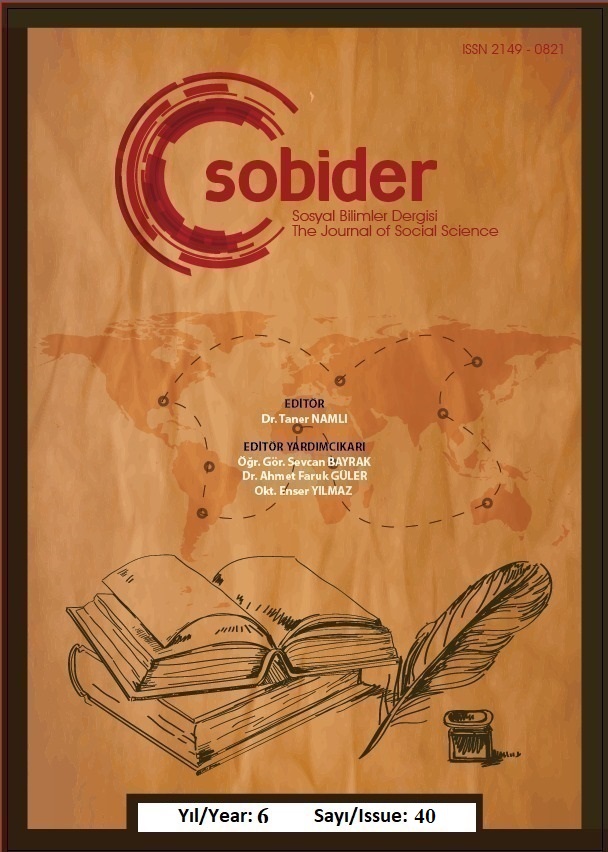Author :
Abstract
Müfessirler, bazı âyet ve sûrelerin tefsirinde ihtilaf ettikleri gibi, Abese Sûresi’nin ilk âyetlerinde de ciddî manada ihtilaf etmişlerdir. Bazıları başta hadis kitapları olmak üzere değişik kitaplarda zikredilen bir rivâyetten hareketle, sûrede Peygamber Efendimizin îkaz ve îtâb edildiğini söylemişlerdir. Diğerleri ise bu yaklaşıma itiraz etmiş ve bunun doğru olamayacağını delilleriyle izah etmişlerdir. Hakikaten Abese Sûresi’nin ilk âyetleri, ilk bakışta Peygamber Efendimiz’i îkaz ve O’nu îtâb ediyor gibi görünebilir. Makalemizde, sûrenin herkesçe bilinen nüzûl sebebini ele alıp, bu rivâyetin senet ve metin tenkidini yaptık. Daha sonra, sûrenin ilk iki ayetinde kullanılan kelimeleri Kur’ân bütünlüğü içinde ele alıp inceledik. Peşinden de Peygamber Efendimiz’in masumiyetine gölge düşürebilecek böyle bir konuda, Allah Resûlü’nün masumiyetinin, nasıl güneş gibi zâhir olduğunu göstermeye çalıştık. Çünkü en yüce ahlâk üzere gönderilen Allah Rasûlünün, bir Müslümandan, özellikle de a’mâ bir Müslümandan yüz çevirmesinin mümkün olmadığını delilleriyle birlikte ortaya koymaya ve göstermeye gayret ettik. Makalenin sonunda da, ilgili âyetlere yaklaşımımıza uygun olan şekilde meâl vererek kısa bir açıklamasını yaptık.
Keywords
Abstract
Muslim exegetes disagree in the interpretation of many Qur'anic verses and similarly they provide opposing views regarding the explanation of the few verses at the beginning of Chapter Abasa. While some argue on the basis of the existent prophetic tradition that these verses warn and criticise the Prophet whereas others express their dissatisfaction with this commnet and discuss the alternative meanings concerning the elaboration of these verses. Surely, the first few verses of Chapter Abasa at first glance seems a divine warning for the Prophet (pbuh). In this article we deal with the famous exegetical (occasion of revelation) reports. And then we re-evaluate the chains of isnad of these reports critically. Furthermore, we analyse the words in the first verse of the Chapter in the textual context of the Qur’an. And finally we focus on the notion of the prophetic immunity from sin and primarely how the Prophet Muhammad’s sinless nature become clear. As it is very welknown that the Prophet Muhammad was sent with perfect manner and it is impossible to think that he disregarded or completely ignored a blind man. Thus we exerted utmost effort in proving that the Prophet never neglected his prophetic mission and acted prudently and we will give our own translations in relation to these verses.
Keywords
- Abduh, M, (h.1329) Tefsiru Cüz-i Amme, Mısır:Ahmed b. Hanbel, (1985) el-Müsned, Beyrut: Âlûsî, (1985) Ruhu’l-Meânî, Beyrut:
- Aydınlı, A, (1987) Hadis Istılahları Sözlüğü, İstanbul:
- Bigiyef, M. C., (1998) Kitâbu’s-Sünne, Kur’an-Sünnet İlişkisine Farklı Bir Yaklaşım, (trcm., Görmez, M.), Ankara:
- Dervîş, Muhammed, (1994) İ’râbu’l- Kur’ân, Beyrut: Ebussuûd, (trs) İrşâdu’l- Akli’s-Selîm, Beyrut:
- Elbânî, Muhammed, es-Silsiletü’d-daîfe, bâb, 1443, 3/442; www.alalbany.net et-Tâcî, A, (1981) Vahyu’l-Kur’ân, Kâhire:
- er-Râzî, F, (1986) Peygamberlerin Masumiyeti, (trcm, Ulma, H.F.), İstanbul: Fîrûzâbâdî, (trs) Tenvîru’l-Mikbâs min Tefsîri İbn Abbâs, Beyrut:
- Hâzin, (h.1415) Lübâbü’t-Te’vîl fî Meâni’t-Tenzîl, Beyrut:İbn Ebî Hâtim, (1999) Tefsiru’l-Kur’âni’l-Azîm, Beyrut:el-Askalânî, İ. H., (h.1326) Tehzîbü’t-Tehzîb, Haydarâbât: İbn Kesîr, (trs) Tefsiru’l-Kur’an’i-Azîm, Kahire:
- Kurtubî, (1985) el-Câmi’ li Ahkâmi’l-Kur’ân, Beyrut: Mâlik İbn Enes, (1951) Muvatta’, Beyrut:
- Suyûtî, (1990) Lübâbu’n-Nükûl, Beyrut:
- et-Tabatabâî, Muhammed Hüseyin, (1997) el-Mîzân fi Tefsîri’l- Kur’an, Tahran: Taberî, (1988) Câmiu’l-Beyân, Beyrut:
- Tabersî, (1986) Mecmeu’l- Beyân, Beyrut: Tirmîzî, (1978) Sünen, Mısır:
- Uğur, M., (1992) Ansiklopedik Hadis Terimleri Sözlüğü, Ankara: Vâhidî, (1991) Esbâbü’n-Nüzûl, Demmâm:
- Yıldırım, S., (2006) Kur’ân-ı Hakîm ve Açıklamalı Meâli, İstanbul: Zehebî, (1972) el-Kâşif, Kahire:
- Zemahşerî, (1997) el-Keşşâf, Beyrût:





